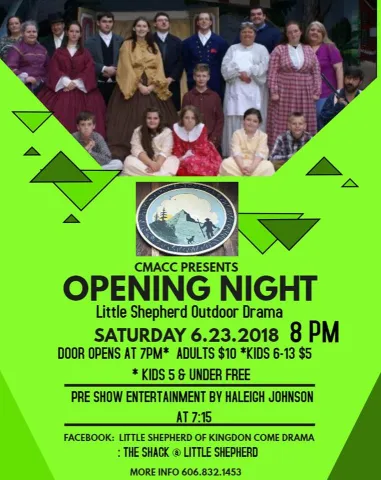The Little Shepherd of Kingdom Come

It was one of the most exciting nights of my life. I had traveled to the wilds of Kentucky to see John Fox Jr.’s The Little Shepherd of Kingdom Come, the most Appalachian of all Civil War era novels, brought to life upon the stage. The setting deep in the woods of the Cumberland Mountains could not have been more authentic as were the stage and the seating.
Some people brought their own chairs, but I found the long benches that appeared to have been made locally to be quite comfortable. Sitting next to me was Cousin Sarah Hutson Reynolds, a granddaughter, of Campbell County Union Veteran William R. “Billy” Hutson. We had traveled together to see the performance. Accompanying us were Sarah's husband, Jack Reynolds, and her daughter Mary “Kitty” Johnson who was also our driver.
Some might be surprised to learn that a number of grandchildren of Civil War veterans are still living in our area. Of course, they were born many years after the war. Most, like Sarah, did not know their grandfathers.
As is to be expected, the drama did at times deviate from the 1903 novel. Perhaps it might sound strange to some, but Chad, “The Little Shepherd of Kingdom Come”, and I have been friends since junior high. I first met him in the school library.
Chad is like a mirror through which we can better understand our history, our heritage, our culture, and ourselves. He is the embodiment of the American spirit. Within his heart still beat the “Spirit of 76”. He is representative of the many young men born in the early 1840s, here in the Cumberlands, who in 1861, rallied to preserve the Union. Chad came of age as the nation came apart. His thoughts on the impending war, expressed in Fox's original work and on the stage, offer insight in to the thinking of the time.
Because Chad's journey on stage begins in preadolescence and follows him in to maturity, two actors, Daniel Hurst and Taylor Horton, were required to play the central role of Chad. Both young men, I trust, are representative of the best of Appalachian youth. The drama was narrated by the schoolmaster Caleb Hazel, portrayed by a convincing Perry Fowler.
Like the men of our own Company B of the First Tennessee Infantry, the fictitious Chad was a participant in the Battle of Mills Springs on January 19, 1862-the first major Union victory of the war. Company B was the first federal unit formed in Tennessee for the American Civil War. It was formed at Jacksboro on August 1, 1861. My grandfather’s grandfather John Hicks and two of his brothers, James and Nathaniel Hicks, joined that day.
Both brothers died of natural causes at Cumberland Ford, Kentucky in April of 1862. No doubt the cold heavy rains that fell on the day of the battle and continued exposure to the elements contributed to their deaths. So far, I have been unable to locate the resting place of the men who died at Cumberland Ford that spring, but suspect and even hope that their mortal remains were moved as “Unknowns” to Knoxville National Cemetery after the war. John Hicks died in May of 1913, and is buried in the family cemetery atop the divide between Sweeten Spring and Sugar hollows.
On Saturday June 23, Chad the title character of The Little Shepherd of Kingdome Come took to the stage for his tenth season. The Little Shepherd Amphitheatre, where the show is staged, is located at 255 Amphitheatre Road, Jenkins, Kentucky. For more information about performance dates and times please call (606) 832-1453 or visit Little Shepherd of Kingdom Come Drama on Facebook.
- Log in to post comments